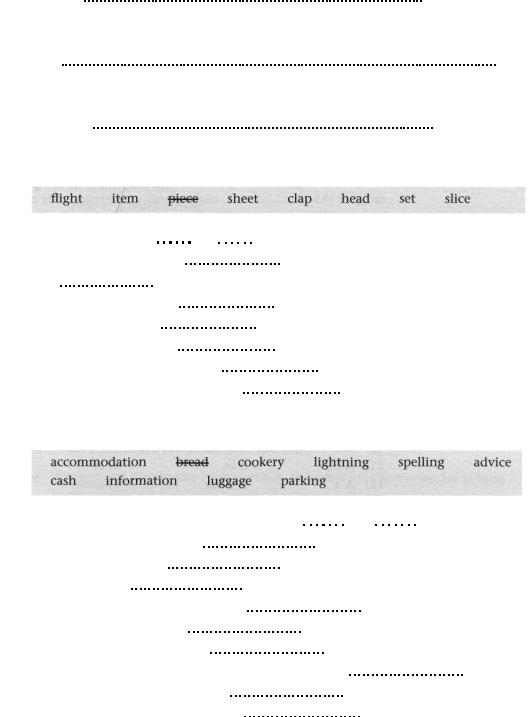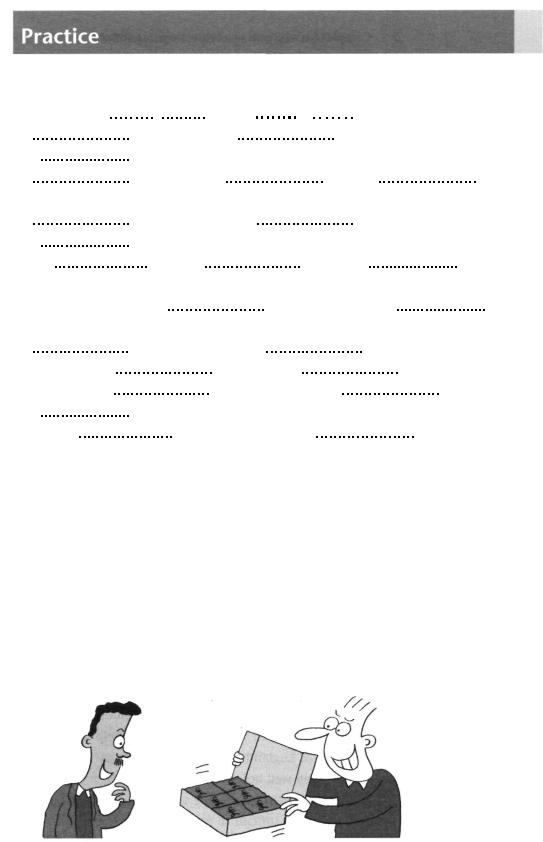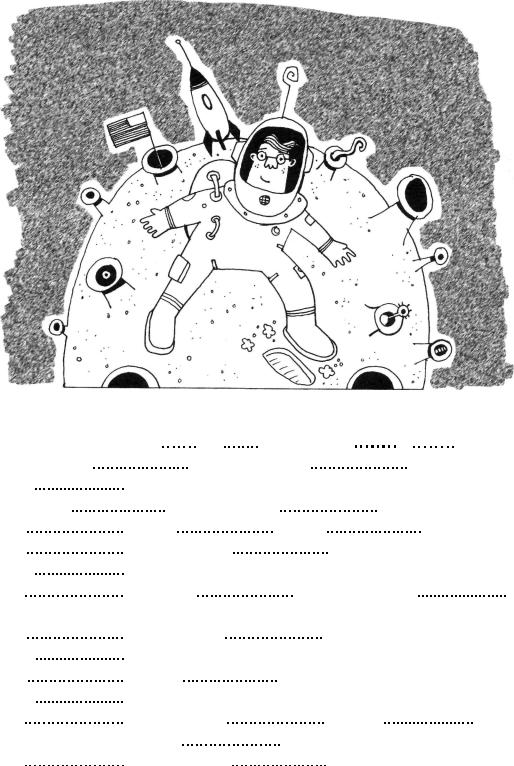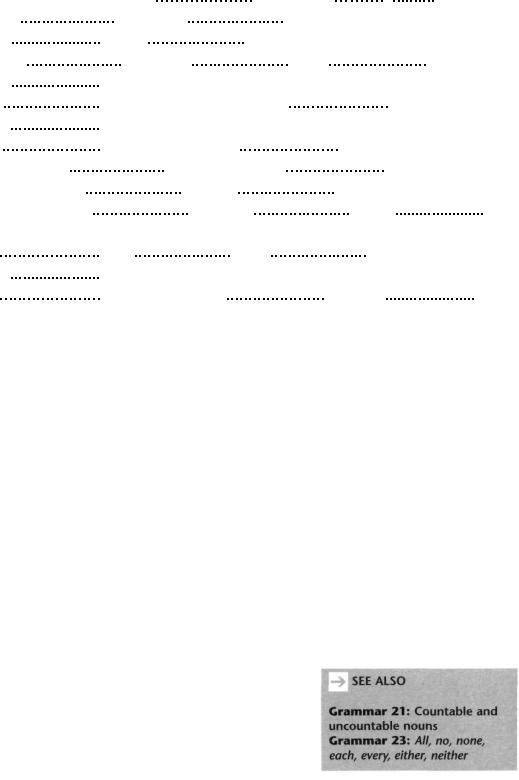
English_books / MacMillan-FCE.Language.Practice.With.Key(M.Vince) nen in
.pdf
GRAMMAR 21 COUNTABLE AND UNCOUNTABLE NOUNS
f) |
There are pieces of paper all over the floor! |
|
|
litter |
|
|
There |
all over the floor. |
g) |
Can I park my car here? |
|
|
allowed |
|
|
Is |
here? |
h)I know these machines are very expensive. machinery
I know |
very expensive. |
8 Complete each sentence with a suitable word from the box.
a) |
Let me give you a |
piece |
of advice. |
|
b) |
There is an interesting |
|
of news in the paper. |
|
c) |
A |
of stairs takes you to the top of the house. |
||
d) |
Could I have another |
|
of paper, please? |
|
e) |
Helen has a lovely |
|
of hair. |
|
f) |
Do you want another |
|
of toast? |
|
g) |
We bought Mike and Lynn a |
of cutlery for a wedding present. |
||
h) |
The lightning was followed by a |
of thunder. |
||
9 Complete each sentence with a suitable word from the box.
a) |
I can't cut this loaf. Do you have a proper |
bread |
knife? |
||
b) |
I'm afraid that 'neice' is a |
|
|
mistake. |
|
c) |
There's usually a/an |
|
space opposite the cinema. |
||
d) We need a/an |
box to keep the money in. |
|
|||
e) |
The tourist board have built a/an |
|
centre near the castle. |
||
f) |
We decided to put a/an |
|
conductor on the |
roof. |
|
g) |
Marjorie used to write a/an |
|
|
column in a magazine. |
|
h) |
These suitcases are very heavy. We must find a/an |
trolley. |
|||
i) |
I must rush. I'm going to a/an |
|
|
lesson. |
|
j) |
Julie found her flat through a/an |
|
agency. |
|
|
123

FIRST CERTIFICATE LANGUAGE PRACTICE
10 Decide which answer (A, B, C or D) best fits each space.
Food habits |
|
|
|
|
Breakfast is one of those (1) |
B.. |
that varies from person to person, |
||
and country to country. For some (2) |
it means a (3) |
|||
of toast and some coffee. In various places I've also been offered |
||||
(4) |
or fruit. (5) |
executives might eat breakfast at the |
||
(6) |
, while for many schoolchildren breakfast is a |
|||
(7) |
of milk at home, and then a long wait (8) |
the |
||
first break of the morning, when they eat (9) |
or |
|||
(10) |
chocolate bar. Some families sit down and eat together |
|||
(11) |
the morning, and listen to (12) |
news on the |
||
radio or (13) |
|
early morning television. For other people, the early |
||
morning is a rush (14) |
|
work or school, and there just simply isn't |
||
(15) |
|
|
|
|
1) |
A times |
B meals |
C foods |
D plates |
2) |
A people |
B persons |
C breakfasts |
D us |
3) |
A sheet |
B loaf |
C slice |
D sandwich |
4) |
A a cheese |
B the cheese |
C cheese |
D cheeses |
5) |
A Business |
B A business |
C Business's |
D Businessmen |
6) |
A train |
B street |
C morning |
D office |
7) |
A glass |
B piece |
C warm |
D box |
8) |
A to |
B is |
C until |
D which |
9) |
A sandwich |
B the sandwich |
C a sandwiches |
D sandwiches |
10) |
A a |
B some |
C a piece |
D a glass of |
11) |
A for |
B in |
C at |
D while |
12) |
A a |
B what |
C some |
D the |
13) |
A look |
B watch |
C see |
D regard |
14) |
A to |
B from |
C at |
D and |
15) |
A there |
B it |
C enough |
D time |
Key points |
1 Check in a dictionary to be sure that a noun is countable or uncountable. |
||
|
The meaning of a noun may change depending on whether it is used in a |
||
|
countable or uncountable sense. |
|
|
|
Note that some nouns ending in -5 take a singular verb: |
|
|
|
The news is bad today |
|
|
|
And that some nouns only have a plural form: |
|
|
|
The police are arriving shortly. |
|
SEE ALSO |
124

Explanations
Indefinite article |
• With something we refer to for the first time. |
|
{a/an) |
I've just had a great idea. |
I'll give you a call next week. |
•With one of a group of things.
Shall we choose a book from this catalogue?
•Where we use an adjective to describe a noun.
Cairo is a very big city. |
It's a beautiful day. |
•With someone's job.
Peter is a truck driver.
•With singular fractions, group numbers and large numbers.
one and a half kilos |
a dozen eggs |
a hundred envelopes |
•Meaning per.
He was doing ninety miles an hour.
Julie earns £500 a week.
Definite article |
• With nouns we have mentioned previously. |
(the) |
There is a bedroom and a living room. The bedroom is quite large. |
•With nouns we mention for the first time, but where it is clear which person or thing we are talking about.
Can you pass the marmalade?
My life changed completely after the war.
•Where there is only one of something. It is clear which one we are talking about.
The moon is full tonight.
•With nouns followed by a descriptive phrase, which makes them definite.
This is the man I told you about.
See also the examples in brackets in the next section, paragraphs 4 and 7. This category includes proper names with a descriptive phrase. Compare with the next section, paragraph 2:
London Bridge BUT the Tower of London
•With national groups.
The British drink far too much tea.
•With classes of people.
The rich get richer and the poor get poorer.
125
FIRST CERTIFICATE LANGUAGE PRACTICE
•With individual items which represent a class.
The lion is fast disappearing.
•With names of musical instruments that we can play.
7 can't play the piano but I can play the guitar.
•With some geographical names. In particular: oceans, seas, rivers, canals and
regions. |
|
|
|
The Thames flows into the North Sea. |
the Arctic |
||
Also with plural countries, |
or where the country name contains a noun. |
||
the Netherlands |
the |
People's Republic of China |
|
•With superlatives, ordinals, the same, the only.
|
|
This is the best. |
You are the first. |
This is the only one. |
|
|
• |
With media. |
|
|
|
|
|
What's on (the) television? |
I went to |
the cinema. |
|
Zero article |
• |
With uncountable nouns and plural countable nouns when we are talking |
|||
(no article) |
|
generally. |
|
|
|
|
|
Give peace a chance. |
Football is life. |
|
|
|
|
I hate wasps. |
All he |
talks about is cars. |
|
•With most continents, countries, states, islands, mountains, lakes, cities, parks, roads and streets, squares, bridges, palaces, castles, cathedrals, stations and airports.
We live in France. We took the train from Paddington Station to Bath.
But see previous section, paragraph 9, for geographical names that use the definite article.
•With company names, years, months, days and special times of the year.
She works for Lufthansa. |
I'll see you in January. |
|
- With names of meals when we are talking generally. |
||
It's time for lunch. |
(BUT The lunch I had at Cafe Sol was good value.) |
|
What's for dinner? |
(BUT The dinner Sue gave us last night was delicious.) |
|
•With unique jobs or roles (the definite article is also possible in these cases).
Jim is (the) chairman of the company.
•With prepositions of place with certain buildings, where the purpose of the building is more important than the place itself.
Sally is in prison. |
(she's a prisoner) |
Sally is in the prison. |
(she's a visitor to that specific building) |
Similar are: bed, church, |
class, court, hospital, school, university |
- With means of transport when we are talking generally. |
|
We went there by car. |
(BUT We went there in the car that Alex borrowed.) |
Note that if we use in or on, we need an indefinite article.
We went there in a car/on a bus.
126

G R A M M A R 2 2 ARTICLES
Put a/an or the in each space, or leave the space blank.
a) |
We went by |
/.. |
- train to |
the |
west of England. |
|
b) |
|
people who live in |
|
Netherlands are called |
|
|
|
|
Dutch. |
|
|
|
|
c) |
|
judge sent me to |
|
prison for |
ten |
|
|
years. |
|
|
|
|
|
d) |
|
Columbus was one of |
|
first people to cross |
|
|
|
|
Atlantic. |
|
|
|
|
e) |
As |
captain of |
ship, I have |
|
||
|
complete authority. |
|
|
|
|
|
f) |
David learned to play |
|
violin when he was at |
|
||
|
university. |
|
|
|
|
|
g) |
|
Trafalgar Square is near |
Charing Cross Station. |
h) |
Did you read |
book I lent you |
last week? |
i) |
We'll put up |
shelves and then go to |
cafe for |
|
|
something to eat. |
|
j) |
Is that |
present Bill gave you for |
Christmas? |
2Underline the most suitable phrase in each sentence.
a)Is this a person/the person you told me about?
b)This is the only cinema/an only cinema in the area.
c)Philip has just bought the Thames barge/a Thames barge.
d)I'm going to the British Museum/British Museum this afternoon.
e)Are you going to church/the church on Sunday?
f)Do you have a milk jug/milk jug?
g)The Prime Minister/Prime Minister will give a speech this afternoon.
h)The computer/Computer has already changed our lives dramatically.
i)I haven't been to an open-air theatre/open-air theatre before.
j)Here is a thousand pounds/the thousand pounds I owe you.
127

FIRST CERTIFICATE LANGUAGE PRACTICE
3 Complete each sentence with the most suitable word or phrase.
a) |
The butler was |
|
.C |
I suspected. |
|
|
||
|
A) last person |
B) a last person |
C) the last person D) some last person |
|||||
b) |
Where |
|
|
you borrowed last week? |
|
|||
|
A) is scissors |
B) are the scissors |
C) is some scissors |
D) are scissors |
||||
c) |
Why don't we go to the park |
|
|
? |
|
|||
|
A) in the car |
B) with a car |
C) with car |
D) by the car |
||||
d) Too much rubbish is being dumped in |
|
|
||||||
|
A) sea |
B) the sea |
C) a sea |
D) some sea |
|
|||
e) |
This is exactly |
|
|
I was looking for. |
|
|||
|
A) job |
B) a job |
C) some job D) the job |
|
||||
f) |
Of all these cars, I think I prefer |
|
|
|
||||
|
A) a Japanese |
B) some Japanese |
C) the Japanese one |
D) a Japanese one |
||||
g) |
I try to go jogging at least four times |
|
|
|||||
|
A) the week B) of the week |
C) a week |
D) of a week |
|
||||
h) |
Sally spent six months out of |
|
|
|
|
|||
|
A) work |
B) a work C) the work |
D) some work |
|
||||
4Complete each sentence (a-i) with one of the endings from 1-9. More than one answer may be possible.
a) Some people say that the |
9. |
b)Most people think that a/an
c)I don't agree that
d)I feel that a
e)I don't believe that a/an
f)I didn't realise that the
g)It's incredible to think that a/an
h)I didn't know that
i)I think it's quite unfair that the
1 good job is an important part of life.
2single injection can protect you from so many diseases.
3hundred miles an hour is too fast even on a motorway.
4the unemployed should receive more help from the state.
5queen of England doesn't pay any income tax.
6tiger may well become extinct very soon.
7third of a person's income should be paid in tax.
8English are difficult to get to know at first.
9the Tower of London was built by William the Conqueror.
128

G R A M M A R 2 2 ARTICLES
5 Put a/an or the in each space, or leave the space blank.
a) |
Neil Armstrong made |
...the |
first footprint on |
the |
Moon. |
|
b) |
There was |
accident yesterday at |
|
corner of |
||
|
street. |
|
|
|
|
|
c) |
I need |
time to think about |
offer you made me. |
|||
d) |
recipe for |
success is |
hard |
work. |
||
e) |
people who live in |
|
glass houses shouldn't throw |
|||
|
stones. |
|
|
|
|
|
f) |
worst part of |
living in a caravan is |
|
|||
|
lack of space. |
|
|
|
|
|
g) |
book you ordered |
|
last week is now in |
|
||
|
stock. |
|
|
|
|
|
h) |
dancing is |
more |
interesting activity than |
|||
|
reading. |
|
|
|
|
|
i) |
people we met on |
|
holiday in |
|
|
|
|
north of England sent us |
postcard. |
|
|
||
j) |
little knowledge is |
|
dangerous |
thing. |
|
|
129

FIRST CERTIFICATE LANGUAGE PRACTICE
6Complete the second sentence so that it has a similar meaning to the first sentence, using the word given. Do not change the word given. You must use between two and five words, including the word given.
a)There is one problem here, and that's the weather.
only |
|
|
|
|
|
The |
only |
problem |
here |
is |
the weather. |
b) There are no good films on this week. |
|
|
|
||
cinema |
|
|
|
|
|
There is nothing |
|
|
|
this week. |
|
c)Can't you swim faster than that? fastest
Is |
can swim? |
d) I haven't been here before. |
|
time |
|
This is |
been here. |
e)A lot of wine is drunk in France.
French
|
The |
a lot of wine. |
f) |
If you drive faster, it is more dangerous. |
|
|
the |
|
|
The |
dangerous it is. |
g) |
It is difficult to discover what is true. |
|
|
truth |
|
|
The |
discover. |
h) |
Are you a good pianist? |
|
|
piano |
|
|
Can you |
well? |
7Underline the most suitable phrase in each sentence.
a)I was under an impression/under the impression that you had left.
b)I have to go. I'm in a hurry/in hurry,
c) I managed to sell the old painting at a profit/at profit.
d)I think I prefer the other restaurant on the whole/on whole.
e)How many hours do you work, on average/on the average, every week?
f)I was in pain/in a pain after I twisted my ankle.
g) Jack recovered from his accident and is now out of danger/out of the danger.
h)Excuse me, but you're in the way/in a way.
i)Sue felt seasick on the cross-channel ferry/a cross the channel ferry.
j)The burglar hit me on my back of the neck/the back of my neck.
130

G R A M M A R 2 2 ARTICLES
|
8 Put a/an or the in each space, |
or leave the |
space blank. |
|
|
||||
|
|
a) |
What's the use in taking |
/ |
- medicine for |
?! |
cold? |
||
|
|
b) |
Is |
happiness of |
majority more |
important than |
|||
|
|
|
|
rights of |
|
individual? |
|
|
|
|
|
c) |
It's |
long way by |
train to |
north of |
|||
|
|
|
|
Scotland. |
|
|
|
|
|
|
|
d) |
|
philosophers seem to think that |
|
life is |
|
||
|
|
|
|
mystery. |
|
|
|
|
|
|
|
e) |
|
most cars start badly on |
|
cold mornings. |
|
||
|
|
f) |
There was |
time when I enjoyed |
|
skating. |
|
||
|
|
g) |
Do you have |
reason for |
|
arriving late? |
|
||
|
|
h) |
When I arrive |
home I feel |
sense of |
|
|||
|
|
|
relief. |
|
|
|
|
|
|
|
|
i) |
|
end of |
book is |
by far |
|
||
|
|
|
|
best part. |
|
|
|
|
|
|
|
j) |
|
friend always tells me |
|
answers |
to |
|
|
|
|
|
homework we have. |
|
|
|
|
|
|
Key p o i n t s |
1 |
With some types of building, the meaning can change depending on the use of |
|||||||
|
|
the |
article. |
|
|
|
|
|
|
|
|
|
Helen is at school. (the purpose of the school is important - Helen is a |
||||||
|
|
|
|
student or a teacher) |
|
|
|
||
|
|
|
Helen |
is at the school. |
(the building itself is |
important - it is the place |
|||
|
|
|
|
|
where we can find Helen) |
|
|
||
2The use of the article can show something about the context of a short piece of text. In particular, whether an item has or has not been mentioned before.
The BBC reported that the two men have since been recaptured.
Use of the shows that the two men have been mentioned before, and so this is an extract from a longer text.
3Many uses of articles are idiomatic, and should be learned as part of a phrase.
Diana works as a graphic designer.
131

Explanations
All |
- |
When all |
is used to show the quantity of something, it can be followed by of. |
|
|
Jim was |
there all (of) the time. |
- All can be used for emphasis. Note the position.
They all wore white shorts and shirts.
Those stamps you bought me have all disappeared.
•All means the only thing when it is used in the construction all + subject + verb.
All I want is some peace and quiet.
|
It is unusual to use all as a single-word subject or object. Instead we use |
||
|
everything to mean all the things. |
|
|
|
Everything has gone wrong! |
(NOT All has gone wrong!) |
|
No |
• When no is used to show the quantity of something, it can mean not any. |
||
|
There are no plates left. |
No new students have joined the class. |
|
|
- No can also be used with a comparative adjective. |
||
|
It's no worse than before. |
|
|
|
There were no less than 500 applications for the job. |
||
|
- No is not normally used alone before an adjective. Compare: |
||
|
This book doesn't have any interesting parts. |
(usual) |
|
|
There are no interesting parts in this book. |
(unusual - very emphatic) |
|
|
It is not interesting. |
|
|
|
But there is an idiomatic use of no with good. |
|
|
|
I tried hard but it was no good, I couldn't reach. |
(no good = useless) |
|
|
Another common idiomatic use is with -ing forms. |
||
|
Remember, no cheating! |
No smoking, please. |
|
None |
• We do not use no of. Instead, we use none of or none on its own. |
||
|
None of the films that are showing in town look |
very interesting. |
|
|
I've checked all the films that are showing in town. None look very interesting. |
||
|
In everyday speech none is often followed by a plural verb form. In formal |
||
|
speech or writing it can be followed by a singular verb form. |
||
|
None of these telephones work. |
|
|
|
None of the members of the |
committee has arrived yet. |
|
•To emphasize the idea of none we can use none at all or not one.
A:How many people came to the party?
B:None!/None at alU/Not one!
132
